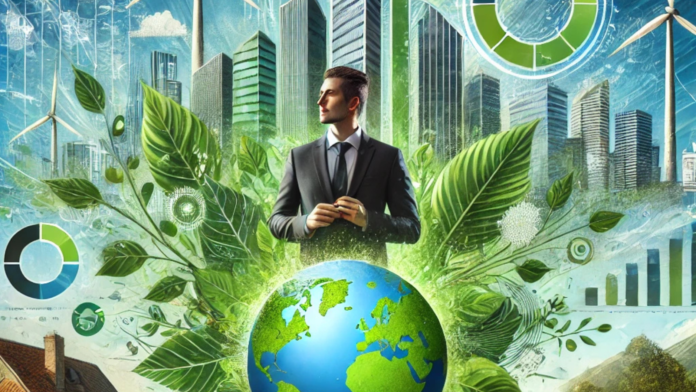Sustainability is no longer just a trend; it has become a vital element of success and growth in today’s business world. As environmental concerns like climate change, resource scarcity, and pollution become more pressing, companies must adapt their strategies to operate responsibly. Beyond ethical reasons, sustainability is increasingly recognized as a driver of innovation, efficiency, and profitability. This article explores why sustainability is essential for businesses today and how it is shaping the future of commerce.
1. Meeting Consumer Expectations
Today’s consumers are more informed and conscientious than ever before. A growing number of customers prefer brands that demonstrate a commitment to environmental and social responsibility. Sustainable businesses are more likely to attract and retain these customers, especially younger generations like millennials and Gen Z, who prioritize eco-friendly products and ethical business practices.
Key Points:
– Consumers are looking for transparency about the environmental impact of products.
– Brands that invest in sustainability build stronger trust and loyalty with their customers.
– Sustainable products are often perceived as higher quality, leading to greater consumer satisfaction.
Example: Companies like Patagonia and The Body Shop have successfully built their brands around sustainability, appealing to environmentally conscious customers and standing out in a crowded market.
2. Regulatory Compliance and Risk Management
Governments and international organizations are implementing stricter regulations to address climate change, waste management, and other environmental concerns. Companies that fail to meet these regulations may face legal penalties, fines, or reputational damage. Sustainability helps businesses not only comply with current laws but also prepare for future regulations.
Key Points:
– Regulatory frameworks such as the European Union’s Green Deal and carbon tax initiatives are pushing companies to adopt sustainable practices.
– Sustainability reduces legal and financial risks by ensuring compliance with environmental laws.
– Proactively addressing environmental risks can prevent costly disruptions to business operations, such as supply chain interruptions due to extreme weather events.
Example: In 2021, large corporations like Apple and Microsoft set ambitious carbon neutrality goals, partly to stay ahead of evolving environmental regulations.
3. Cost Savings and Operational Efficiency
Sustainability initiatives often result in cost savings through greater efficiency and resource conservation. By reducing energy consumption, minimizing waste, and optimizing supply chains, businesses can lower operational costs and improve their bottom line. While the initial investment in sustainability measures may be high, the long-term financial benefits often outweigh these costs.
Key Points:
– Energy-efficient technologies reduce utility costs for businesses.
– Waste reduction and recycling programs minimize material costs and disposal fees.
– Optimized, sustainable supply chains can lead to lower transportation costs and less resource waste.
Example: Walmart’s sustainability efforts, such as reducing packaging and optimizing supply chains, have saved the company billions of dollars while reducing its environmental footprint.
4. Innovation and Competitive Advantage
Sustainability drives innovation as businesses develop new technologies, products, and services that align with eco-friendly goals. Companies that embrace sustainability are often seen as forward-thinking and are more likely to lead their industries. This innovation not only addresses environmental challenges but also creates new market opportunities.
Key Points:
– Sustainable businesses are more adaptable and better positioned to seize emerging opportunities in the green economy.
– Companies that prioritize sustainability often gain a competitive advantage by differentiating their products and services from less eco-conscious competitors.
– Innovation in sustainability fosters the creation of new business models, such as circular economies, clean energy technologies, and sustainable packaging solutions.
Example: Tesla’s focus on electric vehicles and renewable energy has disrupted the automotive industry and positioned the company as a global leader in sustainability.
5. Attracting and Retaining Top Talent
Employees, much like consumers, increasingly seek to work for companies that align with their values. Businesses that emphasize sustainability often attract and retain top talent, especially among younger workers who prioritize environmental and social impact in their careers. Sustainability-focused companies also tend to foster more positive workplace cultures, which contributes to higher employee morale and productivity.
Key Points:
– Employees want to work for companies that make a positive impact on the world.
– A commitment to sustainability improves employee engagement, motivation, and retention.
– Businesses with strong sustainability reputations are more likely to attract purpose-driven professionals who are eager to contribute to meaningful change.
Example: Unilever has found that employees working on its Sustainable Living Plan initiatives report higher job satisfaction and motivation, reflecting the growing importance of corporate purpose.
6. Long-Term Resilience and Financial Performance
Sustainability isn’t just about immediate gains; it’s about ensuring long-term business resilience. Companies that integrate sustainability into their strategies are better prepared to navigate future challenges such as climate change, resource shortages, and evolving consumer expectations. Research has shown that businesses with strong sustainability practices tend to outperform their peers financially in the long run.
Key Points:
– Sustainable businesses are more resilient to environmental, economic, and societal disruptions.
– Integrating sustainability into business strategies promotes long-term profitability and financial stability.
– Investors increasingly consider sustainability when making investment decisions, as businesses with sustainable practices are viewed as lower-risk, long-term investments.
Example: A 2019 Harvard Business Review study showed that companies with strong Environmental, Social, and Governance (ESG) performance tend to have better stock performance and lower volatility compared to those without.
7. Positive Brand Reputation and Trust
Sustainability enhances a company’s reputation, building trust with stakeholders, including consumers, investors, and communities. Companies that act responsibly toward the environment and society are viewed more favorably by the public and are less likely to face reputational crises. A strong reputation for sustainability also makes it easier to form partnerships and secure investments, further contributing to business growth.
Key Points:
– Sustainability enhances brand value and reputation, making companies more appealing to both customers and investors.
– Positive corporate responsibility practices help businesses avoid scandals or negative publicity related to environmental harm.
– Businesses that embrace transparency and responsibility strengthen trust with their stakeholders.
Example: Ben & Jerry’s has built a strong reputation for social activism and sustainability, which has translated into loyal customers and a strong global brand identity.
Conclusion: Sustainability as a Business Imperative
In today’s rapidly changing world, sustainability is no longer an optional or niche concern for businesses—it is a necessity. From meeting consumer expectations and regulatory requirements to driving innovation, cost savings, and long-term resilience, sustainability is essential for businesses to thrive in the modern marketplace.
Embracing sustainability not only benefits the environment and society but also creates opportunities for growth, profitability, and competitive advantage. Businesses that prioritize sustainability are better equipped to succeed in the future, build trust with stakeholders, and contribute positively to the global effort to protect the planet.
Ultimately, the question is no longer whether businesses should pursue sustainability—it is how quickly they can adapt to ensure a sustainable and prosperous future.














